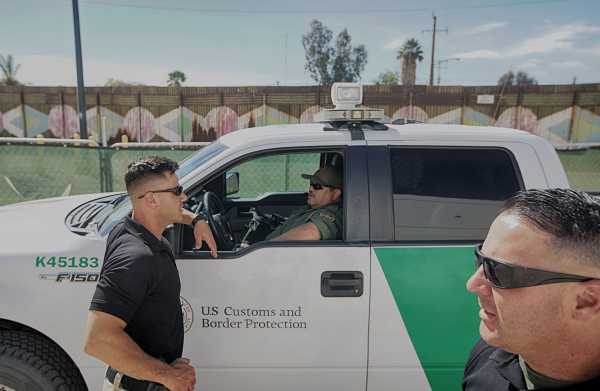
New York Sen. Kirsten Gillibrand (D) introduced a bill Thursday to place more scrutiny on Border Patrol agents when they stop and question passengers on buses and trains.
The Department of Homeland Security Accountability and Transparency Act would require border patrol and immigration enforcement agents to document every instance when they stop, search, or interrogate people. The bill is co-sponsored by Sens. Elizabeth Warren (D-MA), Tom Udall (D-NM) and Jeff Merkley (D-OR). The law applies to all stops by agents who work for US Customs and Border Protection (CBP) and US Immigration and Customs Enforcement (ICE).
Under current law, agents from both departments have broad authority to stop and question people about their immigration status. In the 100-mile border zone — the area of the US that’s within 100 miles of a land or water border — agents can pull over cars and board vehicles to ask passengers about their citizenship if they suspect a person is not in the country legally. (In the rest of the country, ICE agents can’t enter private property without a warrant or pull over vehicles without probable cause of an immigration violation.) But the law doesn’t require agents keep track of whom they stop or why, unless the agents detain someone or end up using force.
The practice of stopping people and asking them their citizenship status happens all over the border zone — in immigrant neighborhoods, on Greyhound buses or Amtrak trains, outside grocery stores.
In recent months, videos of Border Patrol agents boarding buses in New York and Florida have gone viral on social media, alarming civil rights groups and raising questions about the potential violation of a person’s constitutional rights.
Agents have vast powers to question people about their citizenship status, but there are some limits to that power. It’s illegal for agents to stop someone solely because of their race, or for no reason whatsoever. But because CBP and ICE do not keep track of their stops and searches, oversight can be a challenge.
Gillibrand’s bill seeks to bring more accountability to the process. It would require the agencies to start collecting data every time officers question someone about their immigration status when they are not at an airport or border crossing. They would need to report the time, date, and place of each stop, and the basis for questioning someone and the duration of the stop, among other details. The agents would also need to report information about permanent and temporary immigration checkpoints set up in the border zone. The information would be reported annually to Congress and made available to the public. (According to Gillibrand’s office, the bill is partly a response to this Vox article and other media reports about the Border Patrol’s practice of questioning bus and train passengers.)
“Keeping our country safe cannot come at a cost to basic human rights,” Gillibrand wrote in a statement to Vox. “When border patrol agents stop and question people in New York and in many places across the country, they aren’t keeping data about why they targeted a particular person or what happened during their encounter.”
Social media brought attention to the Border Patrol’s immense powers
There is a good chance you saw a video like this in recent months: camera-phone footage of Border Patrol agents getting on a bus or train, then walking down the aisle asking passengers, seemingly at random, if they’re American citizens.
Here’s one that went viral in January:
The video, posted by the Florida Immigrant Coalition, shows CBP agents questioning a Greyhound bus passenger in Fort Lauderdale. The conversation isn’t audible, but the passenger appears to hand agents some paperwork before they escort her off the bus.
A few days later, a passenger on an Amtrak train in Syracuse, New York, filmed Border Patrol agents as they asked passengers where they were born.
Both videos were viewed nearly 4 million times on Twitter, prompting thousands of angry tweets, with many blaming President Donald Trump for the hardline tactic.
These incidents have led to much confusion — and have raised a few questions about immigration and border agents’ authority and the rights people have in these encounters.
It’s important to note that these stops are not a new Trump initiative to crack down on illegal immigration. Border Patrol agents have been doing this for a while, even under the Obama administration. I know this because I watched Border Patrol agents do the same thing back in 2010. I was a crime reporter in South Florida, and I accompanied agents as they questioned passengers at a Greyhound station in the Fort Lauderdale area.
At the time, the agents said they were trying to track down undocumented immigrants heading to Florida from Mexico. But Border Patrol’s methods, coupled with growing anxiety about immigrant rights in the Trump era, have raised concerns about the legal basis for such a practice, and whether current law gives these agents too much power.
DHS does not publish data on how often CBP agents stop and question people in the border zone, so it’s hard to tell if it’s happening more often under Trump. Gillibrand’s bill targets that lack of data and transparency.
It’s absolutely legal for agents to ask a person about their citizenship status, with some exceptions
The videos of Border Patrol agents questioning passengers on a bus sparked outrage partly because this kind of intrusive questioning seems like a constitutional violation. The Fourth Amendment gives Americans a certain right to privacy and protection from unreasonable government intrusions and searches.
What most Americans don’t realize is that near a US border, the bar for what is considered a “reasonable” stop is far lower than it is in the rest of the country. Within 100 miles of a US land or coastal border, Border Patrol and ICE agents can stop vehicles and question anyone about their immigration status, as long as they have a “reasonable suspicion” that the person may be in the country illegally. Anywhere else, ICE agents would need a warrant or probable cause of an immigration violation to stop a vehicle or enter private property.
Here’s the thing: Most Americans live in this so-called 100-mile zone. It covers all of Florida, most of New York state, several other states entirely — including New Jersey, Delaware, and Rhode Island — the nation’s capital, and the country’s largest cities, including New York City and Los Angeles.
CBP officers are supposed to catch unauthorized immigrants who are arriving in the country, so they can only stop people at checkpoints and patrols in this zone. ICE agents are tasked with tracking down people who are working and living illegally in the United States, so they can operate anywhere. But in the border zone, they have the same freedom as CBP agents to pull over cars and board trains to look for unauthorized immigrants.
Congress created this border zone as part of the Immigration and Nationality Act of 1946. The law granted immigration agents the authority to “board and search for aliens any vessel within the territorial waters of the United States and any railway car, aircraft, conveyance, or vehicle.” However, they could only do this “within a reasonable distance” from an external US boundary.
At first, that distance was just 25 miles. But in 1953, the Department of Justice published a rule redefining a reasonable distance to “a distance of not exceeding 100 air miles of any boundary of the United States.” In 2013, a group of senators tried to shrink the 100-mile zone to 25 miles along the northern border. The provision was added to a bipartisan immigration reform bill that passed the Senate that year, but a similar bill never made it through the House.
Over the years, the Supreme Court has upheld Border Patrol agents’ authority to stop and search people in the border zone, while also defining some limit to their powers. For example, the Court has ruled that agents must have probable cause to believe that someone committed an immigration violation to search their car in a border zone, but they only need a reasonable suspicion (a lower standard of proof) to stop and question them. If they establish a roadside checkpoint within the border zone, they can stop and question anyone who drives through about their immigration status.
It’s hard to know how often these stops happen
The Department of Homeland Security doesn’t publish data on how many people agents stop and question in the border zone, only how many people they detain. In 2017, Border Patrol agents arrested 310,531 people at checkpoints and roving patrols across the country. This includes people apprehended trying to cross the border illegally.
Details of these arrests are scarce, and immigrant rights groups have repeatedly tried to get more information through Freedom of Information Act requests.
In 2012, Families for Freedom, a legal aide group for immigrants in New York, succeeded in suing the agency for records related to immigration arrests at bus and train stations in the state.
What they discovered was alarming: At one bus station in the Rochester area, Border Patrol agents mistakenly arrested 300 people with legal status from 2006 to 2010.
That included immigrants with green cards and visitors with tourist visas. It also included 12 American citizens, according to a 2013 report from the group:
Border Patrol agents eventually released everyone who had legal status, but the practice has outraged civil liberties groups.
Lawyers for the American Civil Liberties Union have repeatedly criticized the 100-mile zone, saying that it subjects nearly two-thirds of the US population to Border Patrol’s “so-called investigatory detention and warrantless searches.”
Lawmakers, it seems, have been paying attention. “Border patrol agents have a duty to protect our borders without trampling on our constitutional rights,” said Sen. Warren in a statement announcing the new bill. “Without critical data to track stops and searches, Congress and the public cannot fully monitor and hold agents accountable when they cross the line.”
Sourse: vox.com






